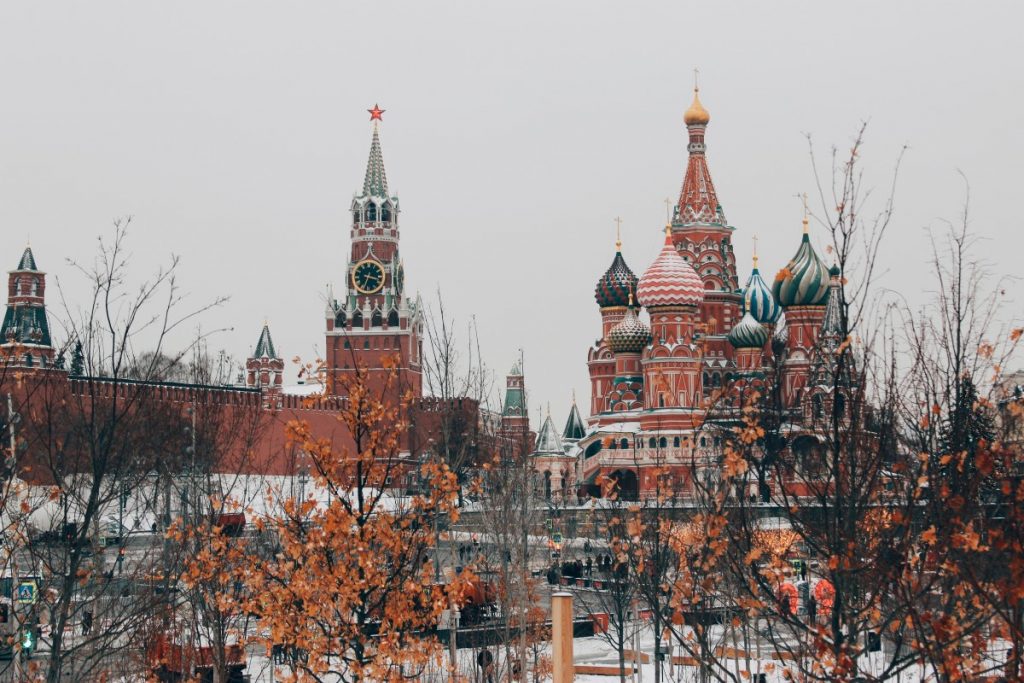Russia is one of the most influential countries in the world. The dimensions of the former tsarist empire alone are impressive: with an area of 17.1 million square kilometers, Russia is the largest country in the world, roughly the size of Europe and Australia combined. In terms of population, Russia only ranks ninth. About 144 million people live here, giving a population density of about eight people per square kilometer.
Since the population is distributed very unevenly across the huge country, there are also major differences in the expansion of the mobile network. In the European part, where comparatively many people live, and in the large metropolitan areas, the network is now very good, with 4G available almost everywhere. Even at tourist hotspots – for example, at the stations of the Trans-Siberian Railway and around Lake Baikal – surfing is usually possible without any problems. The situation is different in the sparsely populated regions: Although there is usually a 3G connection here as well, high-speed surfing is not to be expected here.
How much does mobile surfing cost in Russia?
Compared with Germany, SIM cards and Internet in Russia are rather inexpensive. You can get quite decent data rates for less than ten euros, and rates with unlimited data volume are also comparatively cheap. However, when making this comparison, one should not forget that the average income in Russia is also significantly lower. In 2019, the average Russian had about 840 euros per month at his disposal. It should also be mentioned here that incomes in the Russian Federation are very unevenly distributed, with the urban middle to upper classes doing comparatively well, while the rural population lives in rather modest circumstances.
Since Russia is not part of the EU, tourists with foreign cell phone numbers are still charged roaming fees – and that can get really expensive! If you don’t want to buy a Russian SIM, but don’t want to be completely without a cell phone on vacation, you can book an additional option with most German providers. This is still expensive but much cheaper than the unregulated roaming prices.
These providers exist
There are four major mobile providers in Russia, plus many smaller, regional providers.
It is best for travelers to buy a SIM card at the airport upon arrival, or they can visit one of the stores that are available throughout the country. If you want to be on the safe side before you start your trip, you can also buy the card online in advance. If you are planning a longer stay or want to travel and work in Russia, it is best to choose a tariff with unlimited data volume. As mentioned above, the prices are rather low compared to German standards.
As in Germany, there are also postpaid and prepaid rates in Russia. With prepaid rates, the SIM card is loaded with a certain amount of money, which can then be used to make calls, surf the Internet and send text messages. To add money to a Russian number quickly and easily, you can also use the service of utransto. In the case of postpaid models, the customer concludes a contract in which a monthly basic fee and a consumption-based amount are to be paid.
Here is a brief overview of the major providers:
MegaFon (МегаФон)
MegaFon was formed from the merger of several small mobile operators. Today the company has about 62 million customers in Russia and 1.6 million in Tajikistan.
The company also sells hardware with MegaFon branding. This includes cell phones and tablet computers. The devices are not manufactured in Russia but in Taiwan.
MTS (MTC)
Mobile TeleSystems (MTS; Russian Мобильные ТелеСистемы (MTC), Mobilnyje TeleSistemy (MTS)) is the largest mobile operator in Russia by customers. About 100 million customers use the company’s services. Germans can benefit from a partnership with Vodafone when traveling in Russia.
The company also has a presence in other states of the CIS, the successor to the Soviet Union, including Belarus, Ukraine, Uzbekistan, Turkmenistan and Armenia.
Beeline (Билайн).
Beeline operates in Russia, Kazakhstan, Uzbekistan, Georgia, and Armenia. Since 2009, the company, founded in Russia, has been a subsidiary of the Dutch mobile communications group Veon.
Under Veon, the company underwent a rebranding, and since then it has again been very successful on the Russian mobile communications and Internet market.
Rostelecom
PJSC Long-distance and International Telecommunications “Rostelecom” in short Rostelecom (Russian: ПАО междугородной и международной электрической связи “Ростелеком”) is based in Moscow and describes itself as “the largest digital service provider in Russia”. In Siberia and the eastern parts of the country the company offers Internet connectivity via satellite; in the rest of Russia, it still works with conventional radio masts. In the long term, the entire network is to be operated via satellite.
The company has several regional subsidiaries, including CenterTelekom, Dalsvyaz Telekom, Sibirtelekom and VolgaTelekom. Tele2, one of the lowest-cost providers, has also been fully owned by Rostelecom since 2020.
Free Internet in Russia?
The Kremlin and President Vladimir Putin repeatedly face accusations that they do not take freedom of expression and other fundamental democratic rights very seriously. The state apparatus is also trying to gain the upper hand on the Internet. Social media companies are being put under pressure to remove content from their platforms if the Kremlin does not like it. This includes, for example, calls for demonstrations.
In 2019, the government in Moscow decided that the Russian Internet should be disconnected from the rest of the world. An initial test failed, the government plans to try again at the end of 2021. The official goal of the so-called sovereign Internet is better protection against cyberattacks; critics suspect an attempt to curtail diversity of opinion and freedom of information.
